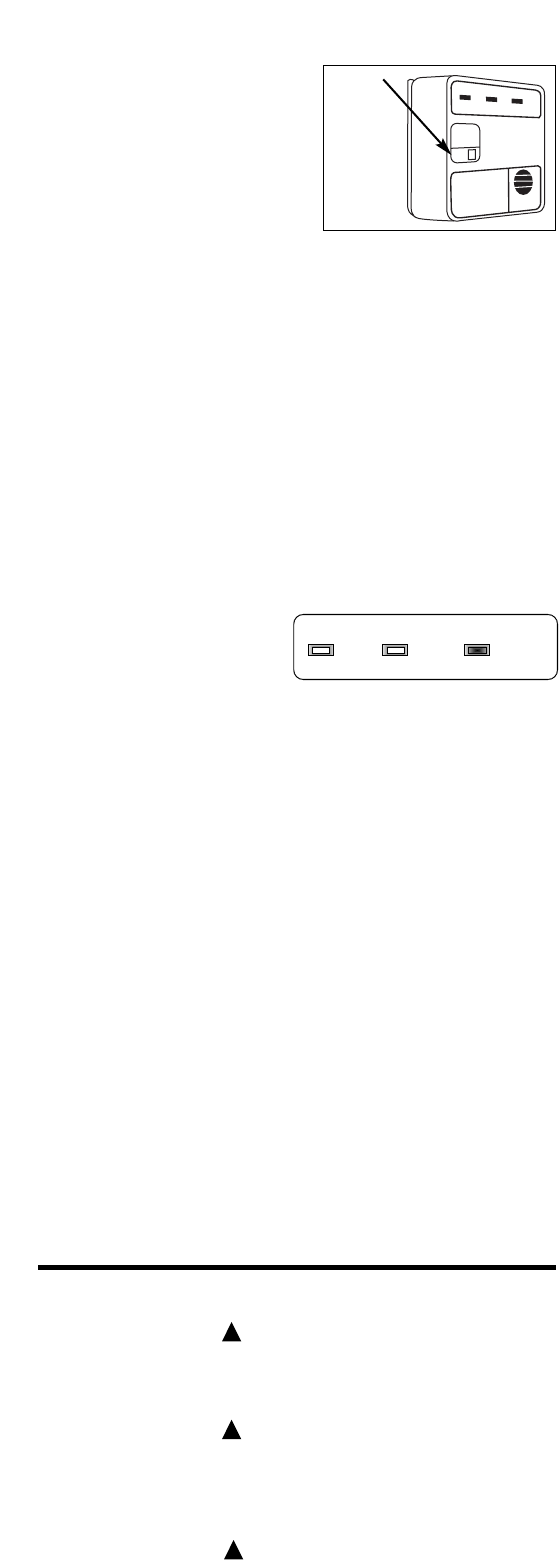
5
How to Install Your CO Alarm (cont.)
11. Firmly PRESS AND RELEASE THE
TEST/RESET button. See Figure 7.
The alarm should sound a short
tone. The amber SERVICE light will
turn on, and the CO alarm will go
through its test cycle. The red LED
will flash, and the alarm will beep
four times followed by 5 seconds of
silence and then repeat the cycle.
After the test cycle, the amber
SERVICE light will turn off, and the green
POWER light will remain lighted which means
the CO alarm is operating properly.
12. If the alarm is interconnected to other CO alarms, press and hold the
TEST/RESET button until the red light turns on. Other interconnected
alarms also will beep four times followed by 5 seconds of silence. The red
ALARM light on other alarms will not light during this test. If the alarm is
interconnected with smoke or heat alarms, the smoke and heat alarms will
remain silent.
13. Two self-adhesive labels have been provided with instructions indicating
what to do if the alarm sounds. Add the phone numbers of your emer-
gency services provider and a qualified technician to each label. Place one
of the labels in a visible area next to the alarm, and place the other label
near a source of fresh air which will be used as a gathering place if the
alarm sounds.
How to Operate Your CO Alarm
This carbon monoxide alarm has been evaluated by UL and meets the
applicable UL standards and requirements.
This CO alarm has a three light and
sound alarm system:
On
Green indicatorconstantly ONindicates unit isreceiving AC
power.
Service Amber indicator flashing and alarm horn beeping every
thirty seconds indicates unit fault. Press and release the
TEST/RESET button. If the alarm returns to displaying the
fault signal, the CO alarm is not operating properly.
REPLACE THE CO ALARM IMMEDIATELY. SEE THE WAR-
RANTY INFORMATION AT THE END OF THIS MANUAL.
Alarm Red indicator flashes and alarm horn sounds four fast
beeps and then is quiet for 5 seconds.
When the CO concentration builds to a level that is equal to 70 ppm or
greater for the duration identified within the standard, the following will
occur:
• The ALARM light and sound signals will activate. See the
WHAT TO DO IF
YOUR ALARM SOUNDS
section of this manual for important action
steps to be taken.
• If you wish to press the TEST/RESET button during this time, the alarm
will become quiet for up to six minutes. The ALARM signals will be
reenergized within 6 minutes from the time the reset button is pressed if
the concentration of carbon monoxide surrounding the alarm remains at
70 ppm or greater.
• The alarm will remain silent if the CO concentration has decreased below
the alarm level of the standard. See WHAT TO DO IF YOUR ALARM
SOUNDS section of this manual for important action steps to be taken.
• The alarm will continue for as long as the condition exists.
The alarm will not permanently end its alarm mode until the concentration
of CO has been reduced to a safe level.
PRESS
IN, HOLD,
AND
RELEASE
TO
RESET
AND/OR
TEST.
FIGURE 7
(Power on/ operating)
(Problem with Alarm)
(Dangerous CO levels)
ON SERVICE ALARM:
MOVETO FRESHAIR
CARBON MONOXIDE ALARM
Características de la alarma de CO (continuación)
ADVERTENCIA
Esta alarma está diseñada para detectar el gas monóxido de carbono de
cualquier fuente de combustión, NO está diseñada para detectar humo,
fuego ni ningún otro tipo de gas. Si suena la sirena de la alarma de CO, no
suponga que se trata de una falsa alarma, sino, préstele atención inmediata.
ADVERTENCIA
Este producto es para usarse en lugares comunes dentro de viviendas
familiares. No está diseñado para medir el cumplimiento con las normas
comerciales o industriales de la Administración de Seguridad y Salud
Ocupacional de los Estados Unidos (OSHA).
Dónde instalar la alarma de CO
ADVERTENCIA
El gas monóxido de carbono puede estar en cualquier parte y en todas
partes, pesa lo mismo o es ligeramente más liviano que el aire y se dis-
persa uniformemente con el aire de la habitación. Por consiguiente,
instale esta alarma de CO donde el aire circule mejor. NO instale la
alarma de CO a un pie 30 cm (1 pie) o menos de la intersección de la
pared con el cielo raso, en la intersección de dos paredes, ni en otros
espacios de “aire muerto”.
Ya que la mayoría de las muertes por CO ocurren mientras las familias
están durmiendo, recomendamos que instale, por lo menos, una alarma
en los pasadizos de las diferentes áreas de dormir y otra alarma en cada
uno de los dormitorios o áreas de dormir.
También recomendamos que instale una alarma en cada una de las áreas
o habitaciones de los diferentes niveles donde los miembros de la familia
están con frecuencia, así como en el sótano. Las figuras 1, 2 y 3 mues-
tran las ubicaciones típicas de las alarmas dentro de la casa.
Esta alarma puede compartir el cable de interconexión de las alarmas de
humo y calor, PERO esta alarma permanecerá en silencio si el humo es
detectado por las alarmas interconectadas de humo y calor. Por lo tanto,
!
!
!
Español


















